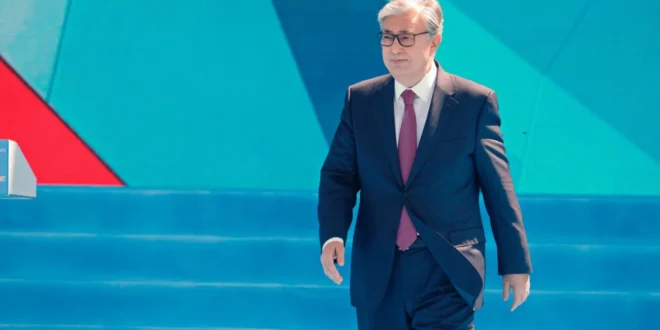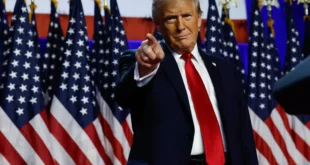America needs partners in Eurasia who can help Washington at a time when Moscow and Beijing are trying to undermine the architecture of the international system.
After a decisive victory, former President Donald J. Trump is gearing up to return to the White House. As is the case with second-term presidents removed from the constraints of reelection, President-elect Trump is likely to pursue policies he believes in, especially in the global arena where American chief executives enjoy wide latitude of action. Trump will be assuming office at a moment of growing global disorder. Dealing with it will require out-of-the-box thinking and new partners, especially in Eurasia.
In this chaotic age of intensifying conflicts, largely fueled by great power competition, a second tier of nations are asserting themselves. Increasingly known as the “Middle Powers,” states in different regions of the world, such as Australia, Brazil, Indonesia, or Poland, driven by a combination of threats and opportunities, are trying to play a role in the management of a global architecture under increasing stress and strain. One such emergent player is Kazakhstan, with its unique positioning between Russia, China, and the United States.
The incoming Trump administration needs a strategic approach to relations with Astana and the broader Central Asian region.
I was in the Kazakh capital October 15–18, attending a conference on the rise of middle powers and the implications for an international system in growing disarray. The Kazakhstan Institute for Strategic Studies had invited an array of scholars and former foreign policy practitioners from across the globe to assess the role of second-tier nations in an age of peril not seen since the end of World War II. Kazakhstan, in the heart of the Eurasian supercontinent, is in the process of shaping the global conversation on the subject.
On the same day that the conference kicked off, Kazakhstan declined the membership offer in the BRICS grouping led by China and Russia. Presidential spokesperson Berik Uali said, “At the same time, at present and, most likely, in the foreseeable future, Kazakhstan will refrain from submitting an application to BRICS.”
Uali explained that President Kassym-Jomart Tokayev views the United Nations as a “universal and uncontested organization” and seeks reforms to the UN Security Council to reflect the interests of middle powers. This positioning is in keeping with Astana’s long-standing multi-vector approach to foreign policy, a concept coined by President Tokayev himself in the 1990s when he was serving as foreign minister.
Tokayev was the keynote speaker at the conference, underscoring the challenges his country faces in navigating an increasingly acrimonious state of great power competition. He believes a negotiated settlement of the Ukraine war is imperative and warned that “the alternative is a war of mutual extermination.” The Kazakhs see continued conflict in Ukraine as a threat to their national security because of its potential to damage their political economy and even sovereignty and independence. They see the inability of Washington and Moscow to reach a settlement and, as major stakeholders, are hoping to play the role of a mediator.
Unfortunately, the West demonstrated its inability to deter Russia from invading Ukraine. Furthermore, after failing to prevent the war, the Biden administrationhas proved unable to help Kyiv defend itself properly against the Kremlin’s military onslaught. In the past few months, Russian forces have begun to push deeper into Ukrainian territory, a situation that Tokayev noted in his speech when he described Moscow as “militarily invincible.” As uncomfortable as it is, this perception stems from battlespace realities and the ineffectiveness of the Western sanctions regime.
The Kazakh leader went on to speak of the central role of the United Nations, which he stressed was the foremost international body to tackle global problems. Its flaws, he argued, could be rectified by empowering regional and middle powers, particularly in the Security Council. This shows that while Kazakhstan will maintain its close ties to Russia and China, it is not interested in joining BRICS, a forum dominated by the two principal adversaries of the United States. Instead, Astana is interested in playing in major league geopolitics, which requires balancing between competing interests.
Kazakh foreign policy ambitions represent a historic opportunity for the United States that it cannot pass up. America needs partners in Eurasia who can help Washington at a time when Moscow and Beijing, the two anti-status quo great powers, are trying to undermine the architecture of the international system. Therefore, it is crucial that the United States move beyond its current arms-length relationship with Kazakhstan and Central Asia, which, unfortunately, both Democratic and Republican administrations have maintained. The Trump transition team should plan to move beyond the “enhanced strategic partnership dialogue” with Astana, benefiting the mutual security and economic interest of the two countries, as well as enhancing the ties with Central Asia and contributing to the cause of international security and stability.
Kamran Bokhari, PhD, is the Senior Director of Eurasian Security and Prosperity at the New Lines Institute for Strategy & Policy in Washington. Bokhari is also a national security and foreign policy specialist at the University of Ottawa’s Professional Development Institute. He has served as the coordinator for Central Asia Studies at the U.S. Department of State’s Foreign Service Institute. Follow him on X at @KamranBokhari.
Image: Shutterstock.com.
 Geostrategic Media Political Commentary, Analysis, Security, Defense
Geostrategic Media Political Commentary, Analysis, Security, Defense





